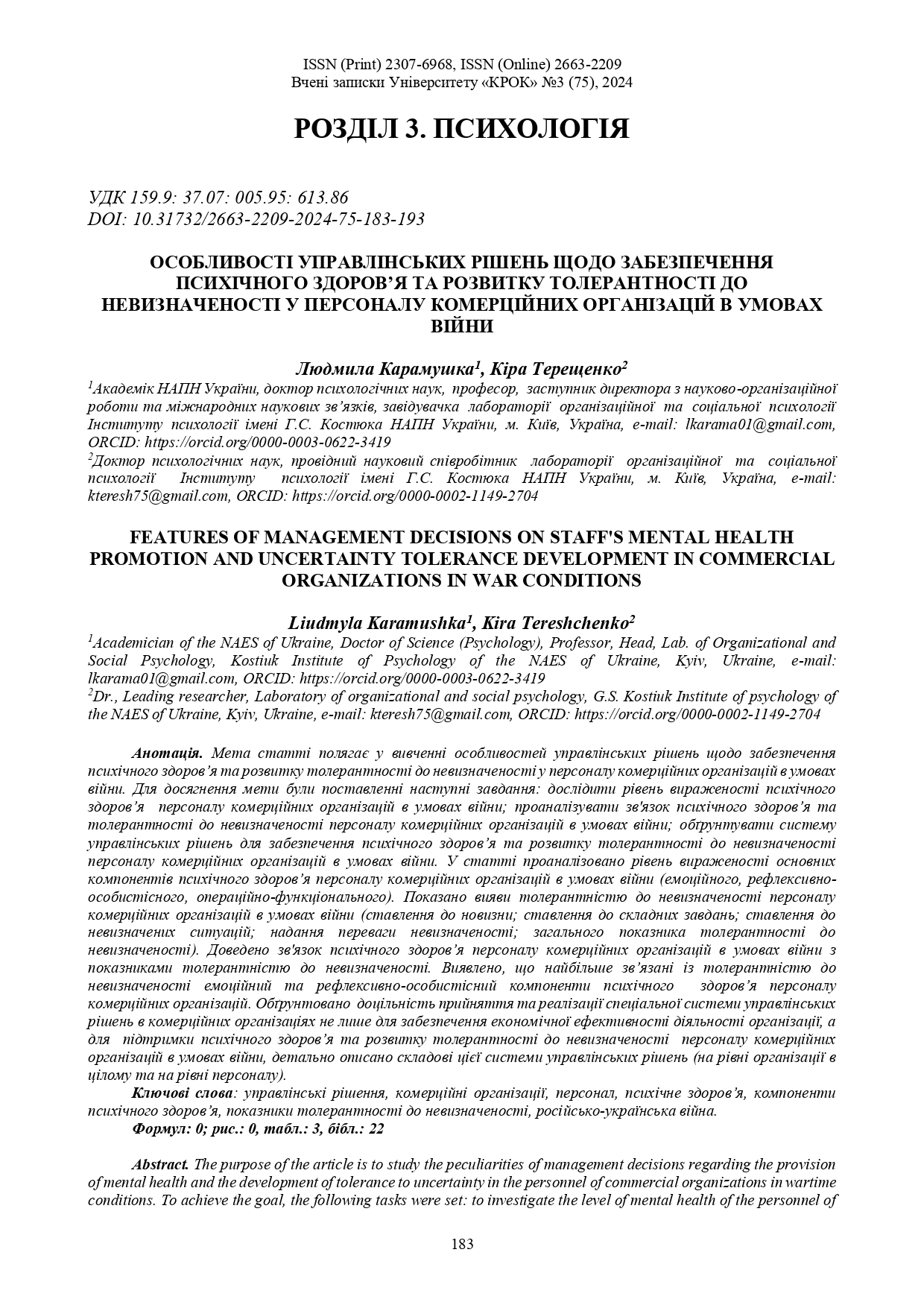FEATURES OF MANAGEMENT DECISIONS ON STAFF'S MENTAL HEALTH PROMOTION AND UNCERTAINTY TOLERANCE DEVELOPMENT IN COMMERCIAL ORGANIZATIONS IN WAR CONDITIONS
DOI:
https://doi.org/10.31732/2663-2209-2024-75-183-193Keywords:
management decisions, commercial organizations, staff, mental health, mental health components, indicators of uncertainty tolerance, warAbstract
The purpose of the article is to study the peculiarities of management decisions regarding the provision of mental health and the development of tolerance to uncertainty in the personnel of commercial organizations in wartime conditions. To achieve the goal, the following tasks were set: to investigate the level of mental health of the personnel of commercial organizations in war conditions; to analyze the relationship between mental health and uncertainty tolerance of the personnel of commercial organizations in the conditions of war; justify the system of management decisions to ensure mental health and develop tolerance for uncertainty of personnel of commercial organizations in war conditions.The authors analyze the levels of development of the main components (emotional, reflective-personal, operational-functional) of mental health as well as the manifestations of uncertainty tolerance (attitude to novelty, attitude to complex tasks, attitude to uncertain situations, preference for uncertainty, general uncertainty tolerance) of commercial organization staff in war conditions. There was found a relationship between the commercial organization staff's mental health and the indicators of uncertainty tolerance in war conditions. The emotional and reflective-personal components of the commercial organization staff's mental health were most closely related to uncertainty tolerance. The author makes a conclusion about the expediency of a special system of management decisions in commercial organizations not only to ensure the economic efficiency of the organization, but also to promote staff's mental health and uncertainty tolerance in war conditions. The components of the management decision system are described in detail (at the level of organization as a whole and at the staff level).
Downloads
References
Батюк, Б. Б. (2024). Інноваційні управлінські рішення в умовах сучасних викликів Наукові інновації та передові технології. Серія «Управління та адміністрування», Серія «Право», Серія «Економіка», Серія «Психологія», Серія «Педагогіка»), 2(30), 365-372.
Гординя, Н. (2023). Психологічні особливості прийняття ефективних управлінських рішень державними службовцями в умовах воєнного стану в Україні. Вісник Національного університету оборони України, 71(1), 48–58. https://doi.org/10.33099/2617-6858-2023-71-1-48-58.
Гусєв, А. І. (2007). До проблеми формування та розвитку толерантності до невизначеності. Науковий часопис Національного педагогічного університету імені М. П. Драгоманова. Серія № 12. Психологічні науки, 17 (41), ч. 1, 101-113.
Діденко, М. (Ред.) (2023). Як зберегти ментальне здоров’я працівників: Поради для роботодавців. ГО «Точка опори» ЮА.
Карамушка, Л. (2021). «Healthy organizations»: сутність, основні напрямки та методи активності для забезпечення психічного здоров’я персоналу. Організаційна психологія. Економічна психологія, 2-3 (23), 40-49. https://doi.org/10.31108/2.2021.2.23.5
Карамушка, Л.М. (2023a). Психічне здоров’я персоналу організацій в умовах війни. Інститут психології імені Г.С. Костюка НАПН України. https://lib.iitta.gov.ua/737839/
Карамушка, Л. (2023b). Можливості використання методу позитивної психотерапії для реалізації концепції «Healthy Organizations». Організаційна психологія. Економічна психологія, 29(2-3), 25-38. https://doi.org/10.31108/2.2023.2.29.3
Карамушка, Л.М., & Сняданко, І.І. (2010). Психологія організаційної культури. (На матеріалі промислових підприємств). Київ-Львів: Край.
Карамушка, Л. М., Креденцер, О. В., Терещенко, К. В., Лагодзінська, В. І., Івкін, В. М., & Ковальчук, О. С. (2021). Психолого-організаційні детермінанти забезпечення психологічного здоров’я персоналу освітніх організацій в умовах соціальної напруженості: монографія / за ред. Л. М. Карамушки. Київ – Львів : Видавець Вікторія Кундельська.
Лазос, Г. (2022). Психологи і війна: зміна парадигми надання психологічної/психотерапевтичної допомоги та резільєнтність фахівця. Організаційна психологія. Економічна психологія, 3-4 (27), 37-47. https://doi.org/10.31108/2.2022.3.27.3
Олексюк, Р. (2024). Прийняття господарських та управлінських рішень в умовах війни за посередництвом візуалізації інформації. Економіка та суспільство, 63. https://doi.org/10.32782/2524-0072/2024-63-62
Семиченко, В., & Артюшина, К. (2019). Проблема невизначеності у теорії та практиці вищої школи. Вісник Національного авіаційного університету. Серія: Педагогіка. Психологія, 2(15). 141–152. Відновлено з https://er.nau.edu.ua/handle/NAU/41847
Сингаївська, І. В., Гура, Г. Н. (2023). Психологічні особливості ухвалення рішень керівниками бізнесу в ситуації невизначеності. Організаційна психологія. Економічна психологія. 29(2-3). 95–111.
Томаржевська, І. В. (2018). Феномен «толерантність до невизначеності» і його психологічний аналіз. Психологічний журнал, 1. http://psyj.udpu.edu.ua/article/view/152564
Чижевський, С., Колесніченко, О., & Бондаренко, О. (2022). Актуальні проблеми розвитку системи психологічної реабілітації військовослужбовців – учасників бойових дій. Честь і закон (Т. 81), 2, 139–149. http://chiz.nangu.edu.ua/article/view/263832/ 260094
Щотка, О., & Андрєєва, Я. (2021). Можливості та обмеження використання гумору персоналом освітніх організацій для опанування робочим стресом. Організаційна психологія. Економічна психологія, 2-3(23), 100-107. https://doi.org/10.31108/2.2021.2.23.11
Chudzicka-Czupała, A., Hapon, N., Ho Chun Man, R., Li, D.-J., Żywiołek-Szeja, M., Karamushka, L., Grabowski, D., Paliga, M., McIntyre, R.S., Chiang, S.-K., Pudełek, B., Chen, Y-L. & Yen, C-F. (2023). Associations between coping strategies and psychological distress among people living in Ukraine, Poland, and Taiwan during the initial stage of the 2022 War in Ukraine. European Journal of Psychotraumatology, 4(1), 2163129.
https://doi.org/10.1080/20008066.2022.2163129
Lukat, J, Margraf, J., Lutz, R., VanderVeld, W. M., & Becker E S. (2016). Psychometric properties of the Positive Mental Health Scale (PMH-scale). BMC Psychology, 4(8). https://doi.org/10.1186/s40359-016-0111-x
McLain, D. L. (1993). The MSTAT-I: A new measure of an individual's tolerance for ambiguity. Educational and Psychological Measurement, 1(53), 183-189.
Miliutina, K., Trofimov, A., Zelenin V., Andrushchenko T., & Karamushka L. (2023). The Role of Pets in Preserving the Emotional and Spiritual Wellbeing of Ukrainian Residents During Russian Hostilities. Journal of Religion and Health, 62(1), 500-509. https://doi.org/10.1007/s10943-022-01669-4
Moroz, L. (2023). Principles and directions of administrative activity of the head of the enterprise during the conditions of war. European Science, 2(sge23-02), 7–19. https://doi.org/10.30890/2709-2313.2023-23-02-013
Wallston, K.A., Wallston, B.S., & DeVellis R. (1978). Development of Multidimensional Health Locus of Control (MHLC) Scales. Health Education Monographs, 6(1). 160-170. https://doi.org/10.1177/109019817800600107
WHO. «Mental health» (2022). https://www.who.int/news-room/fact-sheets/detail/mental-health-strengthening-our-response

Downloads
Published
How to Cite
Issue
Section
License

This work is licensed under a Creative Commons Attribution-NonCommercial 4.0 International License.

